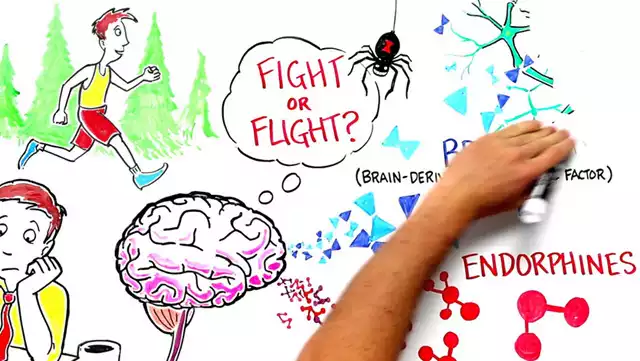Mental Health And Exercise
Imagine a pill that could elevate your mood, reduce anxiety, enhance your focus, and improve your overall well-being without any side effects.
What if I told you this magical remedy isn’t found in the pharmaceutical aisle but rather in the gym or on the jogging trail?
Welcome to the transformative world of mental health and exercise.
This potent duo doesn’t just shape bodies; it shapes minds as well.
In today’s fast-paced world, where every scroll through social media can spark stress and every news alert seems gloomier than the last, maintaining mental health has never been more crucial.
Exercise is often touted for its physical benefits, yet its profound impact on mental wellness remains underappreciated.
From releasing feel-good endorphins to fostering social connections in group fitness classes, incorporating exercise into your routine can be a game-changer for both mind and body.
Let’s delve deeper into how breaking a sweat might just be the best therapy session you’ll ever have.
Mental health has become a major concern in today’s society, with increasing levels of stress, anxiety, and depression affecting individuals of all ages.
While traditional treatments such as therapy and medication have proven to be effective, there is a growing body of research that suggests exercise can also play a significant role in improving mental health.
In fact, studies have shown that regular physical activity can alleviate symptoms of depression and anxiety, reduce stress levels, and improve overall well-being.
Despite this evidence, there remains a lack of understanding and awareness about the connection between mental health and exercise.
Therefore, it is crucial to delve deeper into this topic and explore the various ways in which exercise can positively impact our mental health.
In this article, we will examine the benefits of exercise for mental health, the recommended types and amounts of physical activity, and practical tips for incorporating exercise into daily life.
By shedding light on this important topic, we hope to empower individuals to take control of their mental health and use exercise as a tool for achieving a happier and more fulfilling life.
Table of Contents Mental Health And Exercise
Benefits of Exercise for Mental Health
Engaging in regular exercise not only promotes physical well-being but also has profound positive effects on mental health.
Research has consistently shown that exercise can help alleviate symptoms of anxiety and depression, boost mood, and enhance overall psychological well-being.
When we exercise, our brain releases endorphins, which are natural mood-boosting chemicals that can reduce feelings of stress and anxiety.
Additionally, exercise promotes the production of neurotransmitters like serotonin and dopamine, which are known to regulate mood and promote feelings of happiness and contentment.
Regular physical activity also improves self-esteem and body image, as individuals experience a sense of accomplishment and empowerment through reaching fitness goals.
Moreover, exercise can serve as a valuable coping mechanism for managing stress and improving sleep quality, both of which are crucial for maintaining optimal mental health.
Incorporating exercise into one’s routine, whether through walking, jogging, yoga, or other physical activities, can greatly contribute to overall mental well-being.
Physical Activity and Mood Boosting Effects
Engaging in regular physical activity has been shown to have significant mood-boosting effects.
Numerous studies have demonstrated that exercise can effectively reduce symptoms of anxiety and depression, leading to improved mental well-being.
This is attributed to the release of endorphins during exercise, which act as natural mood elevators and can alleviate feelings of stress and anxiety.
Additionally, physical activity stimulates the production of neurotransmitters such as serotonin and dopamine, which play a crucial role in regulating mood and promoting a sense of happiness and contentment.
Moreover, exercise can enhance self-esteem and body image, as individuals experience a sense of accomplishment and empowerment through achieving their fitness goals.
By serving as a valuable coping mechanism for managing stress and improving sleep quality, regular physical activity becomes an essential component in maintaining optimal mental health.
The Connection Between Exercise and Stress
Engaging in regular physical activity has been found to have a strong correlation with reduced stress levels.
When we exercise, our bodies release endorphins, which are natural stress-fighters.
These endorphins act as mood-enhancers, helping to alleviate feelings of tension and anxiety.
Additionally, exercise provides a much-needed break from daily stressors, allowing individuals to focus on the physical activity at hand and temporarily relieve their minds from stressors.
Furthermore, participating in physical exercise can improve our cognitive function and ability to handle stress by increasing blood flow to the brain and promoting the growth of new brain cells.
Overall, the connection between exercise and stress is undeniable, making regular physical activity an effective strategy for managing and reducing stress levels in our daily lives.
Endorphins: The Brain’s Feel-Good Chemicals
Regular physical activity not only has a positive impact on our stress levels but also plays a significant role in boosting our mood and overall mental well-being.
One of the key contributors to this effect is the release of endorphins, often referred to as the brain’s feel-good chemicals.
These neurotransmitters are naturally produced by our bodies during exercise and are known to create a sense of euphoria and happiness.
The release of endorphins not only provides an immediate mood boost but can also have long-term benefits for mental health.
By incorporating regular exercise into our routines, we can harness the power of endorphins to improve our overall mood, reduce symptoms of anxiety and depression, and promote a greater sense of well-being.
Exercise as a Natural Antidepressant
Engaging in regular exercise has been shown to be a powerful tool in managing and alleviating symptoms of depression.
Numerous studies have found that exercise can be as effective as certain medications in treating mild to moderate depression.
When we exercise, our brains release endorphins, which act as natural mood elevators.
These endorphins not only help to reduce feelings of sadness and despair but also increase feelings of relaxation and overall well-being.
Additionally, exercise promotes the production of brain-derived neurotrophic factor (BDNF), a protein that plays a crucial role in promoting the growth and health of brain cells.
This can lead to improvements in cognitive function, memory, and overall brain health.
Incorporating regular exercise into a comprehensive mental health plan can provide a natural and effective way to manage symptoms of depression and enhance overall emotional well-being.
Building Resilience through Regular Exercise
Engaging in regular exercise not only has a positive impact on mental health but also plays a significant role in building resilience.
When faced with challenging situations, individuals who regularly exercise often exhibit greater adaptability and emotional stability.
This can be attributed to the physical and psychological benefits of exercise.
Physically, exercise reduces the levels of stress hormones such as cortisol and stimulates the production of endorphins, which are natural mood enhancers.
These physiological changes can help individuals better cope with stress and adversity, enabling them to bounce back more quickly.
Moreover, the discipline and dedication required to maintain a regular exercise routine can translate into increased mental resilience, as it fosters a sense of self-efficacy and the ability to persevere through difficult times.
By incorporating regular exercise into their lives, individuals can cultivate the resilience needed to navigate life’s challenges with greater ease and confidence.
Incorporating Mindfulness into Workouts
Developing a mindful approach to workouts can enhance the overall benefits of exercise on mental health.
Mindfulness involves focusing on the present moment and being fully aware of one’s thoughts, emotions, and bodily sensations without judgment.
When applied to workouts, mindfulness helps individuals tune into their bodies, improving the mind-body connection.
This can involve paying attention to breathing patterns, the sensation of muscles working, and the overall experience of the exercise.
By practicing mindfulness during workouts, individuals can increase their awareness of the body’s needs and limits, preventing injuries and promoting a more satisfying exercise experience.
Additionally, incorporating mindfulness into workouts can promote a sense of calm, reduce stress levels, and improve overall mental well-being.
By integrating mindfulness techniques into exercise routines, individuals can optimize the mental health benefits of physical activity and cultivate a greater sense of overall well-being.
Finding the Right Exercise Routine
Developing an effective exercise routine is crucial for optimizing physical fitness and achieving personal goals.
Finding the right exercise routine involves considering various factors, such as individual fitness levels, preferences, and specific fitness goals.
It is essential to choose exercises that target different muscle groups and incorporate elements of cardiovascular endurance, strength training, and flexibility.
Consulting with a fitness professional or personal trainer can provide valuable guidance in designing a personalized exercise routine that meets individual needs and ensures proper form and technique.
Regularly reviewing and adjusting the exercise routine based on progress and evolving goals is important for continued growth and improvement.
By finding the right exercise routine, individuals can maximize the benefits of physical activity and enhance overall health and well-being.
In conclusion, incorporating regular exercise into one’s routine can have numerous positive effects on mental health.
From reducing symptoms of anxiety and depression to improving overall mood and self-esteem, the benefits of exercise for mental well-being cannot be overstated.
By prioritizing physical activity and self-care, individuals can take important steps towards managing and improving their mental health.
Remember to always consult with a healthcare professional before starting any new exercise regimen, and may you find strength and peace in caring for both your physical and mental well-being.
FAQ
How does regular exercise impact mental health and well-being?
Regular exercise has been shown to have a positive impact on mental health and well-being by reducing symptoms of anxiety and depression, improving mood, boosting self-esteem, and promoting better sleep.
Physical activity releases endorphins, which are known as the “feel-good” hormones, and can also help to relieve stress and increase cognitive function.
Additionally, exercise can provide a sense of accomplishment, increase social interactions, and improve overall quality of life.
Overall, incorporating regular exercise into one’s routine can have significant benefits for mental health and well-being.
What types of exercise are most beneficial for improving mental health?
Any form of exercise that combines physical activity with mindfulness, such as yoga, tai chi, or Pilates, can be highly beneficial for improving mental health.
These types of exercises help reduce stress, increase relaxation, and improve overall mood by promoting mind-body connection and stress relief.
Additionally, aerobic exercises like running, swimming, or cycling have been shown to release endorphins, which can boost mood and reduce symptoms of anxiety and depression.
Ultimately, the best type of exercise for improving mental health is the one that brings joy and a sense of accomplishment to the individual.
Can exercise help alleviate symptoms of anxiety and depression?
Yes, exercise has been shown to help alleviate symptoms of anxiety and depression by releasing endorphins, reducing stress hormones, improving sleep, and boosting self-esteem.
Regular physical activity can have a positive impact on mental health and overall well-being.
How does physical activity affect the brain and its ability to cope with stress?
Physical activity boosts the production of endorphins, serotonin, and other neurotransmitters that improve mood and reduce stress.
Regular exercise also increases blood flow to the brain, promoting the growth of new brain cells and improving cognitive function.
Additionally, physical activity can help individuals develop better coping mechanisms for dealing with stress by providing a healthy outlet for releasing tension and promoting overall mental well-being.
In summary, engaging in physical activity positively impacts the brain by enhancing its ability to cope with stress through both biological and psychological mechanisms.
What are some strategies for incorporating exercise into a mental health treatment plan?
Some strategies for incorporating exercise into a mental health treatment plan include setting manageable goals, finding activities that you enjoy, scheduling regular workout sessions, incorporating physical activity into your daily routine, seeking social support through group classes or workout partners, and being mindful of the positive effects of exercise on mental well-being.
Additionally, exploring various types of physical activities such as yoga, hiking, or dancing can help keep the routine engaging and sustainable.
Making exercise a priority in your treatment plan can lead to improved mood, reduced stress, and enhanced overall mental health.







